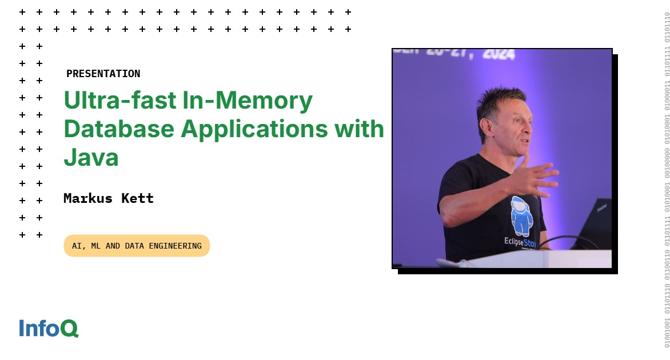Infoq
1M
145

Image Credit: Infoq
Presentation: Ultra-fast In-Memory Database Applications with Java
- The presentation discusses ultra-fast in-memory database processing with Java, showing how to build the fastest database applications by leveraging a framework used by gaming and banking companies for two decades.
- It emphasizes the importance of high performance, low data storage costs, simplicity for developers, and sustainability for organizations in modern applications.
- The speaker, Markus, with over 20 years of Java experience, introduces Eclipse Foundation projects like Jakarta EE, Micronaut, and Helidon before delving into current challenges in database development.
- He highlights issues like slow performance, high cloud costs, complexity, and lack of sustainability in traditional database programming.
- The talk addresses the limitations and challenges of object-relational mapping, impedance mismatches, and the compatibility issues between Java and databases.
- It explores the differences in NoSQL databases and their compatibility with Java, mentioning the need for a new approach to database development for modern applications.
- The alternative solution presented is EclipseStore, a Java-native, in-memory persistence engine that offers ultra-fast data processing, significant cost savings, and environmental benefits by eliminating the need for traditional database servers.
- Markus explains the EclipseStore workflow of seamlessly storing Java objects to disk without the need for object-relational mapping, emphasizing the simplicity and effectiveness of the approach.
- He introduces the Eclipse Serializer at the core of EclipseStore, detailing its persistence engine, handling of concurrency, and compatibility with distributed systems for high-speed data processing.
- The talk concludes by highlighting that EclipseStore, while requiring Java developers to adapt their mindset, provides a comprehensive and efficient approach to building high-performance applications with low latency and cost savings.
- The speaker invites attendees to explore free training resources for EclipseStore and emphasizes its potential as a drop-in replacement for Hibernate, suitable for various applications and enterprise use cases.
Read Full Article
8 Likes
For uninterrupted reading, download the app